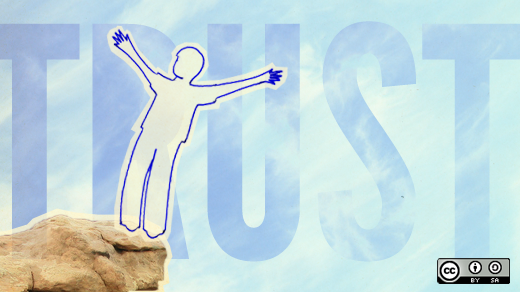One of my software developer friends recently asked me if I could show him what he could do personally to encourage a more collaborative and understanding working environment–one more aligned with the suggestions coming from the DevOps community. The conversation we had was a long one–his situation is unique. That said, some recommendations are universal, and the recommendation I see needed most often is the development of trust within an organization.
For my friend's environment, it seemed to be the key point of failure: Trust between coworkers, trust between teams, trust between managers and employees, trust between executives and everyone else—you get the idea. Most of his problems boiled down to that mutual lack of trust.
There is no easy path to building trust between yourself and others. There is no gigantic easy button that you can push and–presto!–everyone trusts everyone else. However, there are always a few things you can to do improve your situation, and I would like to discuss one of them specifically.
Steps to reduce gossip in your DevOps culture
"If you haven't got anything nice to say about anybody, come sit next to me.” -Alice Roosevelt Longworth
I have often been in a situation where someone has wanted to share some gossip with me about another person. I think it is human nature to want to participate in those types of conversations. Perhaps it gives you a sense of being included, a sense of control over your own environment, or makes you feel favored because you were sought out as a confidante.
In the early days of my career, I actively participated in gossip. I was working for a company that had a very restrictive environment where the only stream of information seemed to be gossip-based. I generally considered any information better than no information, regardless of how false it was. If the saying is true about misery loving company, I had a lot of company at that job.
As a long-time migraine sufferer, I have had years to discover migraine patterns. Times of high stress and anxiety will cause them. In retrospect, when I think about working at that job where gossiping was so frequent and such a high percentage of all communication, I was unquestionably a miserable person. I was having four to five migraines a week, and my stress levels were through the roof. I could easily say that 90% of the gossip shared with me was either inaccurate, didn’t really help me other than to increase my anxiety, or was just flat-out mean. I had to ask myself, "How helpful was that, really?" It just wasn’t.
The bottom line is: don't participate. It increases confusion, misinformation, mistrust, anxiety, and stress. Here is my advice on how to handle gossip:
Self-reflection. Ask yourself these questions:
- What does the person gain from telling me this information?
- What do I gain/lose from sharing/knowing this information?
- How hurt would the person who the information is about be if they knew you were talking about them?
Encourage the gossiper to stop.
- Caution: in case you weren’t already aware, confrontation is hard. I certainly don’t find it easy. The best I can offer here is that you should practice. I tend to practice what I want to say with my husband, with a personal (non-work) confidante, or even with the mirror. The harder the message, the more I have to practice. Sometimes the practice that I do is enough to resolve the situation for me, other times I have to have that hard conversation.
- Be mindful and empathetic of the other person’s feelings when you say “stop.” The first question can help you here. Sometimes people gossip as a way to solicit information from others about something they are individually worried about. If you find this is the case with the person in question, ask yourself a follow-on question: Is there is something I could do to help alleviate the problem?
Calmly accept requests that you stop gossiping.
- Please don’t be offended. Your threshold for what you can tolerate in conversation may be different than someone else’s.
- Be honest with yourself and ask if it was really appropriate to share the information you did.
- Apologize, but only if you honestly mean it. A sincere apology, while sometimes hard to give, can do a lot to help what is likely already a tricky situation.
My experience has been that working in an environment where people don’t trust one another will lead to failure. You must encourage an environment that is low stress, one that you are happy to work in, and one where you feel you can rely on your coworkers. Without trust, Murphy’s Law is in full effect.
A critical component of DevOps is focusing on cultural change. In order for your environment to change, you need to take an active part in that change. There is no easy button for this. However, improving your perception of the people who are around you is a good place to start.
A final, and critical point: your management also must be engaged in creating a safe place for this to be successful. In a future article, I will touch upon what management can do to improve the situation. Until then, let’s start with what you can do to help improve trust.
This article is the first of a multi-part series called "A Practical Guide to Cult(ure) of DevOps."
DevOps
This article is part of the Easy DevOps column coordinated by Greg Dekoenigsberg. Share your stories and advice that helps to make DevOps practical—along with the tools, processes, culture, successes and glorious/inglorious failures from your experience by contacting us at devops-stories@redhat.com.






2 Comments